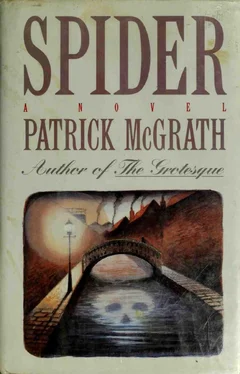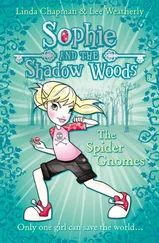I smoke until breakfast time, watching the sky. Banks of billowing blue-gray cloud—this will be a damp day, today the rain will be spitting. I am wearing all my shirts and on top of them a black polo-neck jersey, and on top of that the jacket of my shabby gray suit. Suit trousers, thick gray socks (two pairs), and a large pair of thick-soled black leather shoes with ten close-set lace holes (eyelets) and a sort of flameshaped strip of leather stitched around the toecap and pricked with decorative perforations. Asylum shoes, these, made by the Ganderhill cobbler. I also have strips of brown wrapping paper and thin cardboard taped to my legs and torso, which crackle when I move.
Breakfast was uneventful—dead, fishlike eyes over porridge bowls, the usual squeaky farts. Then straight out into the spitting rain, and off toward the canal, and the streets, thankfully, were empty save for the odd hurrying figure with an umbrella and a blind girl tapping along with her cane. I was noticing details of the world that were new to me, how the corrugated tin that fenced off a patch of wasteground was sharpened at the tips, like a line of spears; the way a brick wall had had bits of broken bottles set in a bed of concrete on top, and painted beneath it in large black letters the words no rubbish. There were weeds sprouting from the concrete, stiff, thistlelike growths, hardy, bristling things. Then under the viaduct, its arches stained black by the rain, and I was damp now, I could smell the dampness on me. A wind was blowing, there was dog shit on the pavement. From a wall dangled a piece of striped cloth and as the wind caught it it flapped at me, a message of some sort. I paused at the main road and waved the traffic on, waved it past me until I could cross over. I seemed to be making for the river; I’d thought I was going to the canal.
The wind was stronger by the river, I had to button my jacket and turn up the collar. I found a bench: two concrete uprights each with a protruding arm to which the three gray-scarred greenish planks were bolted, three more bolted to the uprights for your back. It was damp, I didn’t care, I was damp. In front of me a rusty black railing then the river, gray-green and running strong and choppy in the wind. A structure of wooden pilings a few yards out. On the far side a terrace of houses beneath a forest of cranes leaning drunkenly in all directions as if about to collapse. Gray sky, the great bellying rolls of clouds ponderously pushing east before the wind. The drizzle is a haze that mists me, makes me damp, makes the black wool jersey smell strange. Out with the tobacco, and with the first good lungful comes the thought: today I shall try her room again.
Icame in from the river very damp, late in the afternoon, and went straight upstairs. I had had an idea that I might cross the canal, that I might go to Kitchener Street, finally see what it looked like, twenty years later; but once again something inside me—some deep-seated anxiety, some reluctance, or fear—would not allow me to set foot on the bridge, and I’d followed my usual route along the canal and so back to the house. Now I stood at my window and smoked a fat one as the light thickened and the crows flapped their wings in the bare branches of the trees in the park, and as I did so I heard the front door slam and a moment later I saw her going off down the street with a shopping bag on her arm. I stubbed out the roll-up in the tin I use for an ashtray and made my way quickly to her bedroom. This was something I’d done a few times now, whenever I knew for certain that she was out of the house. This time her door was unlocked; so without any hesitation I went in.
Nothing unusual at first glance. You know what a messy woman she is, how she leaves her underwear all over the room, how she clutters her dressing table with cosmetics and so on, how she never makes her bed: clearly the years have gone some way to repairing these sluttish habits, for this room was neat and tidy, the bed made and not a scrap of underwear in sight. I quickly went through the chest of drawers and found nothing of interest, nor was there anything on or in the bedside table. There were, I noticed, three framed pictures on the walls, two scenic views of the Lake District and over the bed a Madonna and Child. At that point I came back out onto the landing to make sure she hadn’t returned: no sound, only the muted tones of dance music from the wireless in the dayroom. Then back in again, and over to the large dark wardrobe that stood against the wall facing the door. As I stealthily approached I found myself reflected in its long mirror, still in my damp black polo-neck jersey and shabby gray suit; and what a queer furtive creature I looked, tiptoeing long-legged across this gloomy bedroom, what a spider!
I paused at the wardrobe, a hand on the door, and turned my head, once more to listen to the house, for five, ten, fifteen seconds: nothing but the faint, far-off wireless music. I opened the wardrobe—and there it was, the first thing I saw, though it was pushed way down to the end of the rack and almost concealed: that ratty old fur of hers.
Then I heard the front door slam (fortunately it’s a door that’s hard to close quietly) and I rapidly crept away, leaving the room just as I’d found it, crept back to my own room, and, by this time literally trembling with emotion, stood at my window and tried to stay calm.
There I stood for many minutes, my left arm pressed across my chest and the fingers clutching a bony shoulder, and between the still-trembling fingers of the other hand a fat one, I needed it. Slowly the trembling grew less violent, and as that happened the damp smell of the wool jersey rose once more to my nostrils, and finally I shook my head, shook off the last of the emotion, and took off my jacket. I hung it on the back of the door, then off with the ill-smelling jersey. But the odor persisted, and it was only then that I recognized it as gas.
It was a long night. I still don’t know how I got through it, for it was probably the worst one yet. Despite further layers of brown paper taped to my torso, despite the layers of vests and shirts and jerseys on top, the smell of gas was with me until dawn. Of course I had the journal, and this alone, I believe, saved me from doing harm to myself or anybody else. A new strategy from the creatures in the attic: I kept my light on all night of course, and the bulb crackled at me as it usually did, and I paid it no attention—until, that is, the crackling grew suddenly loud, as it had in Kitchener Street the night I’ve described, but this time it was the voices that had taken over, and were producing a sort of chant that came out of the bulb, and the chant went: KILL her kill her kill her kill her KILL her kill her kill her kill her. At this I sat up rigid from my writing and focused my attention on the bulb, but when I did that the noise immediately decayed to a stat-icky buzz and I lost it. Back to work then, though as soon as I was absorbed in the writing the crackle again resolved to that terrible chant, and again I stopped, up came the head, and the chant turned to laughter that slowly faded away and all there was then was a faulty light bulb in an ill-wired house, and a desperate man tormented by messages that issued from he knew not where, the attic above him, the light bulb over his head, or some deep hole in the back reaches of his own sick mind. Oh it was a bad night, may I never, ever see the like of it again.
Toward dawn it grew less intense and I paused, rolled a cigarette, looked over the pages of my book. They were scribbled and smudged, covered with words I had no real interest in reading, not now that the night was almost over. Something was happening to my handwriting, there was a definite slant and flow to it now, it was now a hand and not merely the cramped markings of a man who had read much but written little. It was a fluent hand, the hand of a writer, and in other circumstances, I reflected, I might have regarded these writings with satisfaction, with pride, even. But the circumstances of composition permitted me no such complacency; I took heart only from the faint gray hint of dawn tentatively fingering the eastern sky, and the promise it brought of some respite from these torments, at least for the few brief fleeting hours of daylight. Somewhere in the house a toilet flushed, the pipes rumbled, and in my mind’s eye I saw a dead soul in threadbare, grubby pajamas emerging from a lavatory with bleary eyes crusted with yellowy sleep-matter, foul of breath and yawning stupidly, and shuffling back to his narrow bed to slip again into the sweet oblivion of sleep; and at that moment I would have traded a hand, or an arm— or an arm and a leg!—to be a dead soul with an empty mind and the sweet possibility of sleep before me. To be awake is to be available to torment, and this is the full complete meaning of life.
Читать дальше












